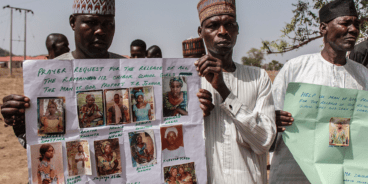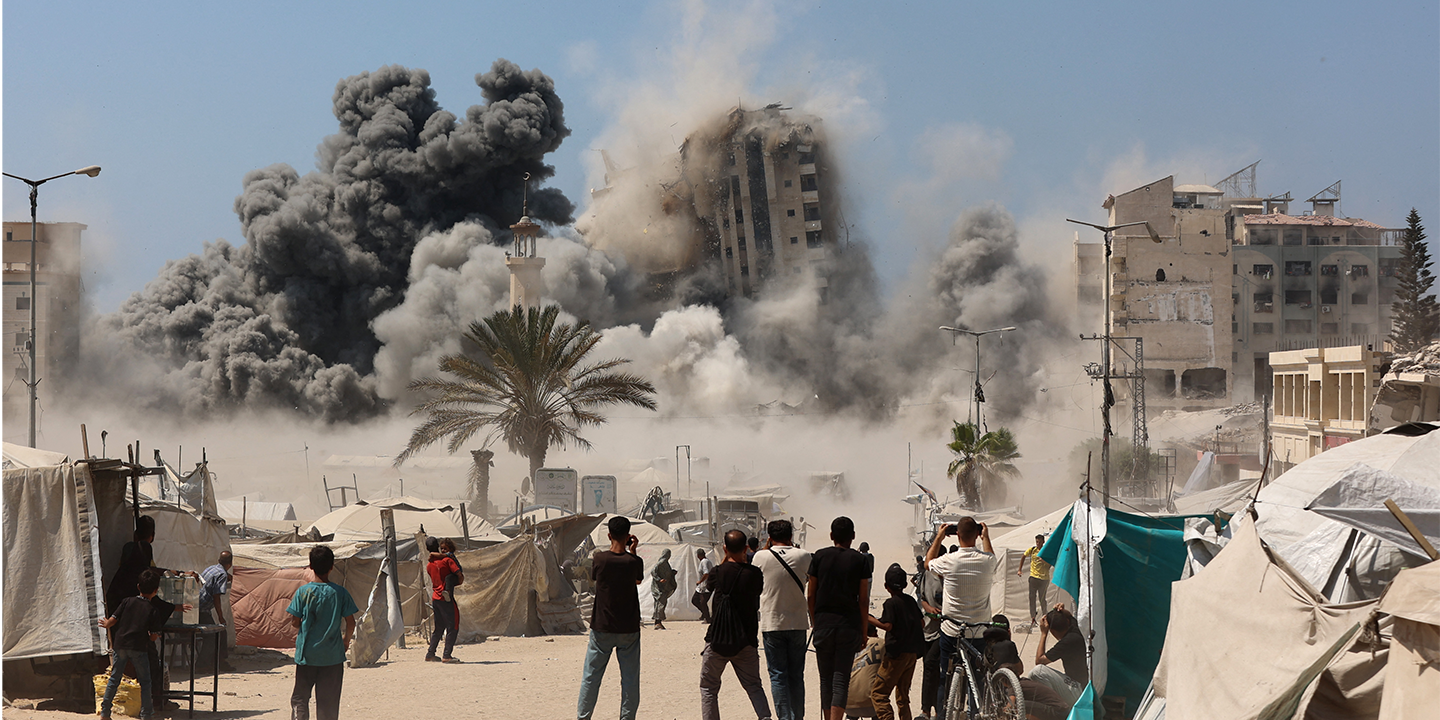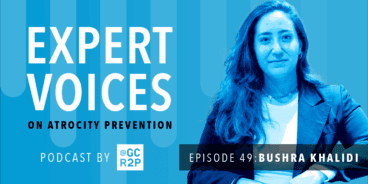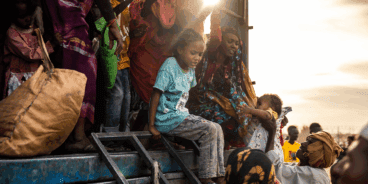

Atrocity Alert No. 453: Israel and the Occupied Palestinian Territory, Afghanistan and Myanmar (Burma)
Atrocity Alert is a weekly publication by the Global Centre for the Responsibility to Protect highlighting situations where populations are at risk of, or are enduring, mass atrocity crimes.
AS NEGOTIATIONS ON “TRUMP PLAN” PROGRESS, ISRAEL’S ASSAULT ON GAZA ESCALATES
On 29 September United States President Donald Trump, during a press conference with Israeli Prime Minister Benjamin Netanyahu, announced a 20-point so-called “Comprehensive Plan to End the Gaza Conflict,” giving Hamas a short deadline to accept the proposal and indicating Israel would have “full backing to finish the job” if Hamas didn’t sign on. Despite President Trump’s call for Israel to halt its bombardments of the enclave and Hamas’ partial acceptance of the proposal on Friday, Israel has continued unabated in its military assault, killing over 100 Palestinians during the first weekend of October.
The “Comprehensive Plan” offers the prospect of a permanent ceasefire, the release of all Israeli hostages and some Palestinian detainees and access for, and the distribution of, humanitarian aid. However, the proposal – which was void of Palestinian engagement and different to the draft presented by Muslim-majority countries – also entails no accountability for the commission of atrocity crimes, puts the future of Palestinian governance under the oversight of the United States and lacks any meaningful commitment to security for Palestinians. Standing alongside President Trump during the announcement of the proposal, Prime Minister Netanyahu reaffirmed that the “transformation” envisioned also required “ending lawfare against Israel at the [International Criminal Court] ICC, the [International Court of Justice] ICJ.”
Over 35 UN experts issued a joint statement warning that major aspects of the plan were “deeply inconsistent with fundamental rules of international law” and the Advisory Opinion issued by the ICJ calling for the end of Israel’s unlawful presence in the Occupied Palestinian Territory. The experts denounced the illegitimate conditions imposed on the Palestinian right to self-determination and warned that “any peace plan must absolutely safeguard the human rights of Palestinians, and not create further conditions of oppression.”
On Monday, leaders convened in Egypt to discuss a roadmap for President Trump’s proposal, with indirect talks mediated between Israel and Hamas. Against this backdrop, the International Committee of the Red Cross and Médecins Sans Frontières have continued to uphold their recent forced suspension of operations in Gaza City due to Israel’s ongoing and escalating assault.
All states must commit to facilitating an urgent and permanent ceasefire agreement for Gaza, ensuring that the pursuit of avenues for justice and accountability does not fall to the wayside. States must join in support of the ongoing proceedings on the Genocide Convention at the ICJ, enforce the arrest warrants issued by the ICC and resolutely defend the courts against attack. For true and lasting peace, the international community must ensure Palestinian agency is central to negotiations and cease the long-enduring pattern of imposing unilateral and conditional decisions on the Palestinian people, in contravention of international law.
UN HUMAN RIGHTS COUNCIL ESTABLISHES AFGHANISTAN INVESTIGATIVE MECHANISM
On 6 October, the UN Human Rights Council adopted a resolution establishing an independent investigative mechanism to collect, consolidate, preserve and analyze evidence of international crimes and the most serious violations of international law in Afghanistan, and to prepare files to facilitate and expedite fair and independent criminal proceedings. Once operational, the mechanism will be the only international body examining abuses and violations committed not only by the Taliban de facto authorities but also by officials of the former government, warlords, members of international forces, non-state armed groups and others responsible for serious human rights violations.
This outcome reflects years of advocacy by Afghan civil society, which has consistently urged the international community to ensure evidence of human rights violations and abuses by all parties is documented and preserved. Such a mechanism represents a critical step in the broader international response urgently needed to address Afghanistan’s deepening human rights and humanitarian crisis.
This milestone comes days after the Taliban imposed a 48-hour nationwide internet shutdown—the first total blackout in Afghanistan—following weeks of severing fiber optic cables in northern provinces under the pretext of preventing “vice.” The Office of the UN High Commissioner for Human Rights highlighted the severe human rights impact of the shutdown, noting that it “curtails the free flow of information crucial to everyday activities, including access to essential services from health and education to banking. Women and girls, already excluded from public life, are especially affected.” In this repressive context, where religion is weaponized to maintain total control over the population—particularly women and girls—internet shutdowns sever the lifeline between Afghans and the rest of the world, restrict civic space, silence dissent and obscure human rights violations.
While internet access has since been restored, the establishment of a new investigative mechanism highlights why connectivity is indispensable to evidence documentation. Several HRC-mandated investigative bodies, such as the FFM on Venezuela, the CoI on Syria and the CoI on Ukraine, use certified digital information, including social media content, to collect evidence and inform their findings. Similarly, the Independent Investigative Mechanism for Myanmar relies on open-source information to gather evidence, corroborate witness testimony and link perpetrators to crimes. The Taliban’s intentional and arbitrary disruption of internet access, as well as the risk of future restrictions on internet access, can be seen as an effort to shield themselves from accountability.
The international community should ensure the new mechanism is fully funded, operational and able to carry out its mandate without obstruction. The private sector should work to enhance internet resilience and accessibility in Afghanistan and elsewhere, mitigating the impact of arbitrary shutdowns.
UN HOLDS CONFERENCE ON THE ROHINGYA AND OTHER MINORITIES IN MYANMAR (BURMA)
On 30 September the UN General Assembly held a High-Level Conference on the Situation of Rohingya Muslims and Other Minorities in Myanmar. During the conference, member states and representatives of the UN and the Association of Southeast Asian Nations pressed for immediate measures to end the commission of atrocities against the Rohingya in Myanmar and guarantee accountability. In his address, the UN High Commissioner for Refugees, Filippo Grandi, warned that for Rohingya still remaining in Myanmar following the genocide in 2017, the situation has only worsened. “Discrimination, the burning of their villages, the exclusion from work and services, the continuous denial of their very identity. The Rohingyas live with the threat of arbitrary arrest and detention, with restricted access to healthcare and education. They cannot move freely. They are subjected to forced labor and forced recruitment. Their lives are defined everyday by racism and fear.”
While the conference refocused international attention, it also exposed persistent inertia that has defined international engagement on Myanmar. Wai Wai Nu, Founder and Executive Director of the Women’s Peace Network, said to the conference participants, “You already have the evidence. You already have the power. What is missing is the political will. The people of Myanmar demand accountability, an end to impunity, and an end to oppression. Let this conference be a historic turning point– the end of missed opportunities, and the beginning of lasting solutions.”
Despite several states making new financial pledges to the over 900,000 Rohingya in refugee camps in neighboring Bangladesh, gaps remain in the provision of lifesaving aid. Voluntary repatriation remains a central focus of discussions on Rohingya refugees, yet the current situation in Rakhine State, and across Myanmar, fails to provide the necessary security guarantees. The absence of accountability and lack of willingness to allow the Rohingya equal participation and protection under the law also inhibits the repatriation process, as the military leaders in charge of orchestrating the genocide in 2017, namely General Min Aung Hlaing, remain in control of the country today.
The 2021 military coup in Myanmar has compounded this violence and deepened fragmentation across the country, entrenching the junta’s control over key institutions. Since the coup, at least 7,328 people have been killed while 3.3 million are internally displaced and 21 million remain in need of aid. The junta has announced plans for elections to be held beginning in December despite its lack of control over a majority of the country. The junta has already ruled out voting in 121 constituencies due to security concerns, excluding many members of minority populations from the vote.
While last week’s conference is a welcome step, timely action is necessary to utilize momentum and make real progress for the Rohingya and other minority populations. Global Centre for the Responsibility to Protect Myanmar expert, Sarah Hunter, said, “Member states must commit to fully funding response plans for Rohingya refugees, including through providing opportunities to regain livelihoods, access to education and other opportunities. Member states must also continue isolating the junta, especially ahead of elections, to ensure the legitimacy sought by the junta is not won.”
Related Content


Expert Voices on Atrocity Prevention Episode 49: Bushra Khalidi
